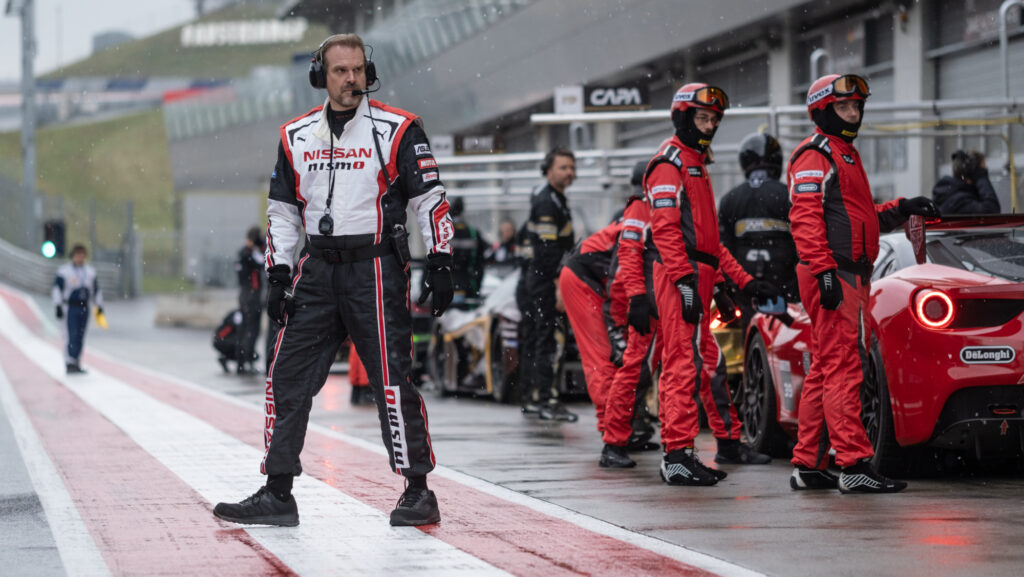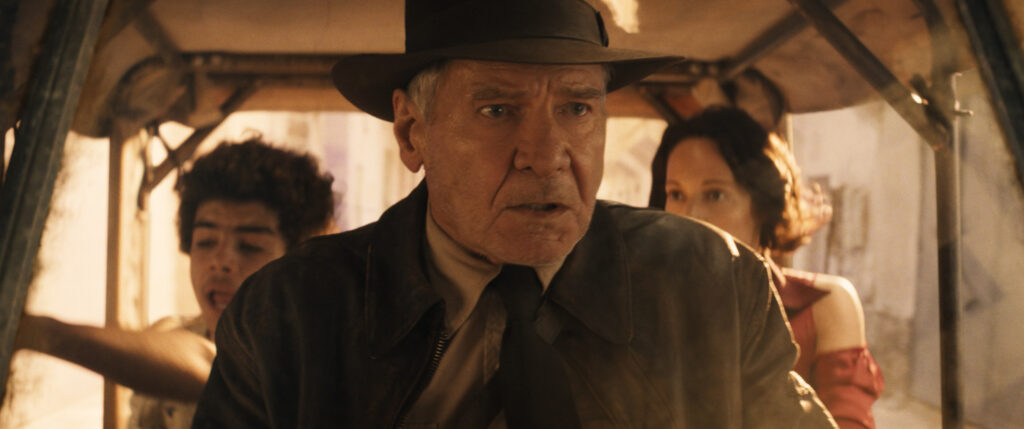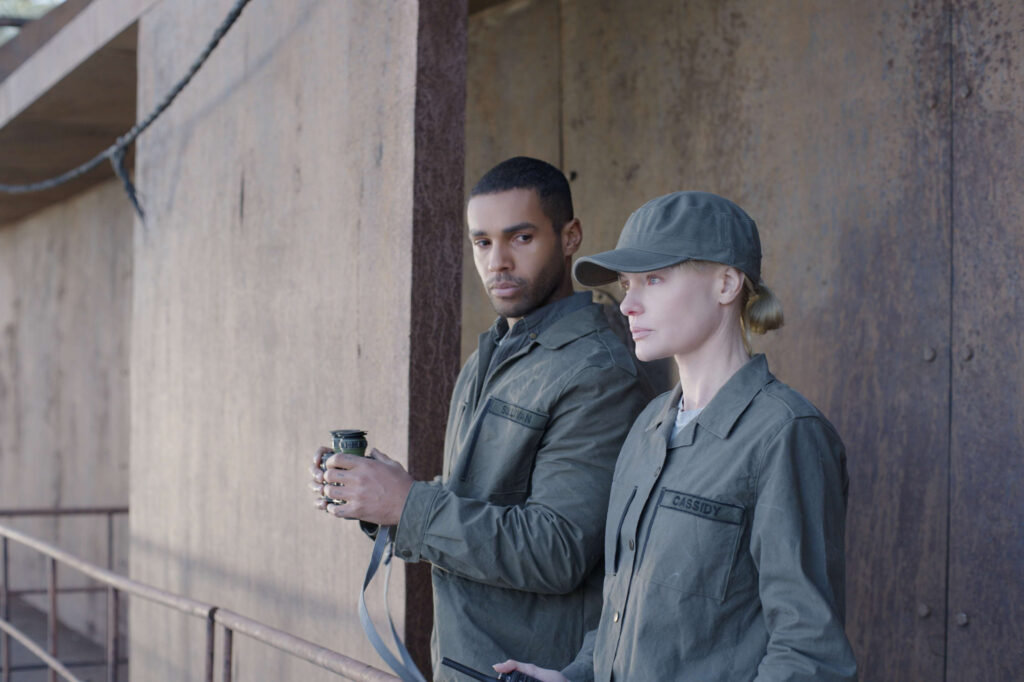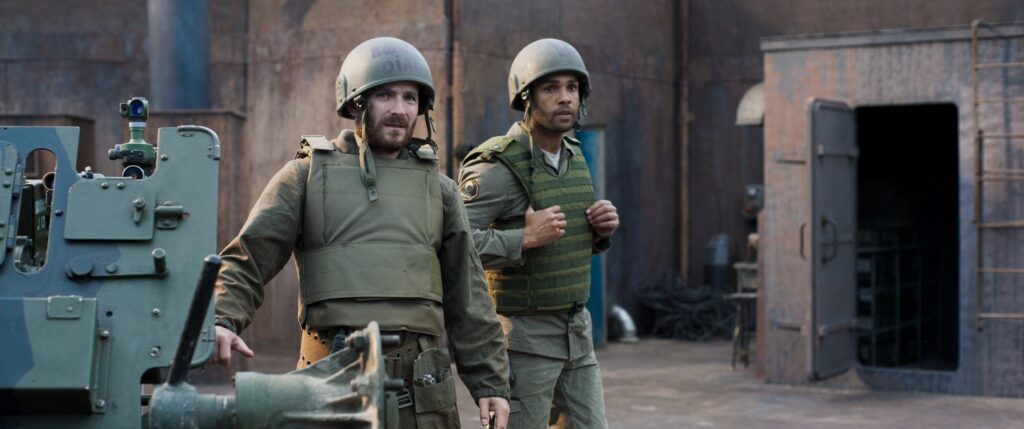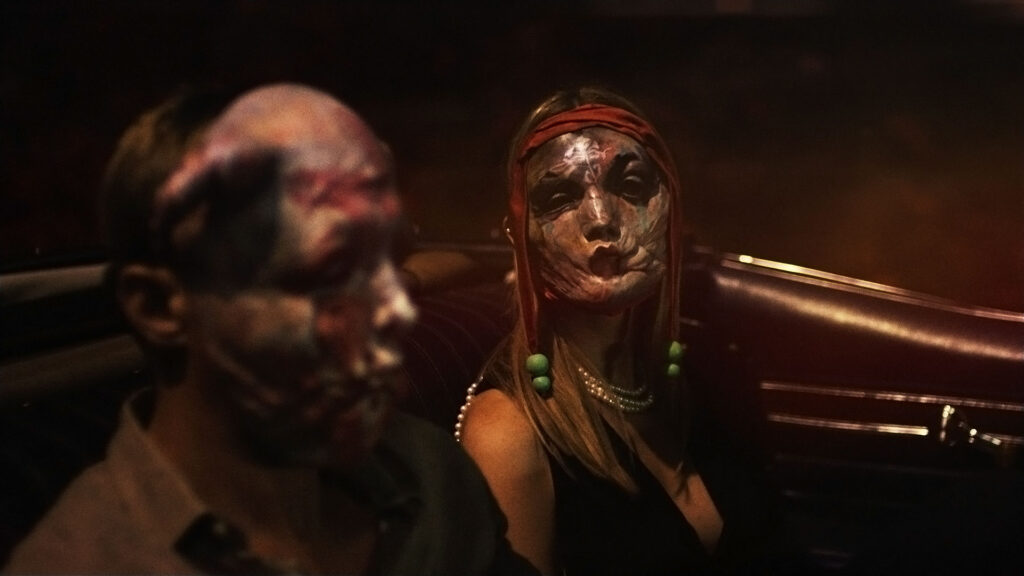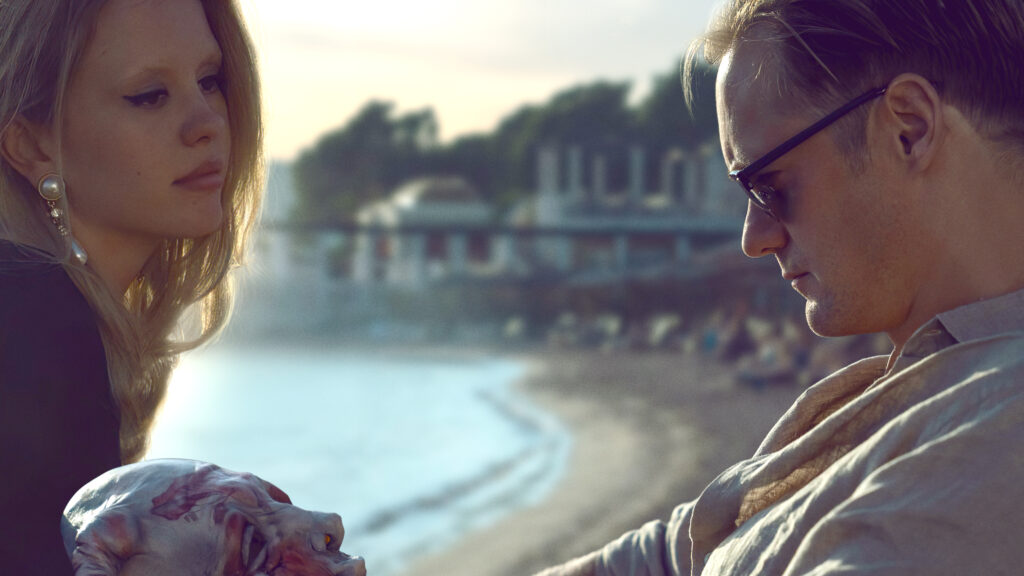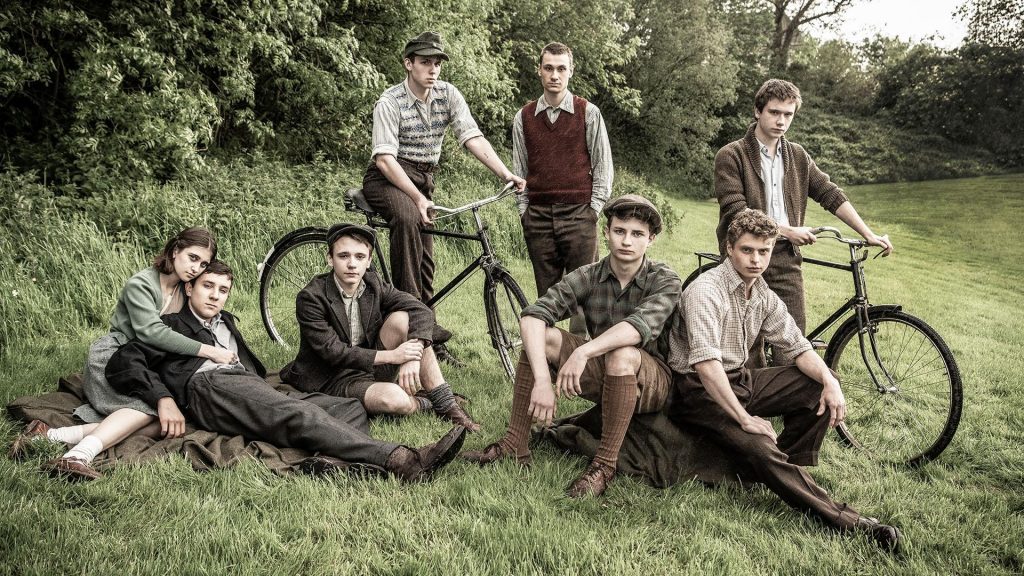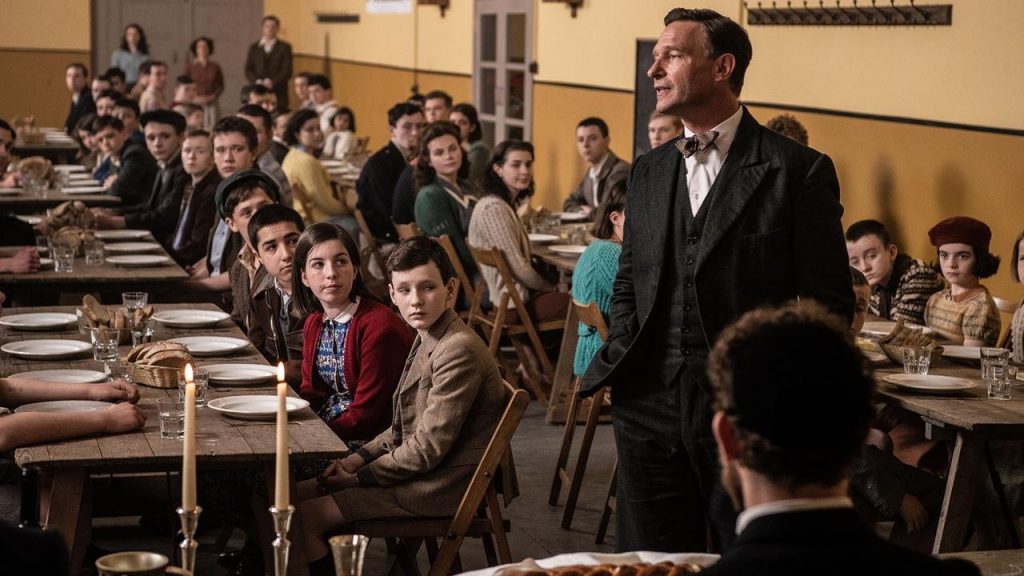February 27, 2024
by Carla Hay

Directed by Gonzalo López-Gallego
Some language in Spanish and French with subtitles
Culture Representation: Taking place on the island of Fuerteventura, which is part of Spain’s Canary Islands, the dramatic film “American Star” features a white and Latin cast of characters (with one black/biracial person) representing the working-class, middle-class and wealthy.
Culture Clash: A jaded assassin gets emotionally attached to a young woman he is supposed to kill, and she sees him as a somewhat of a father figure/substitute for her deceased biological father.
Culture Audience: “American Star” will appeal primarily to people who are interested in watching movies about assassins that are more about psychological repercussions than about high-octane violence.
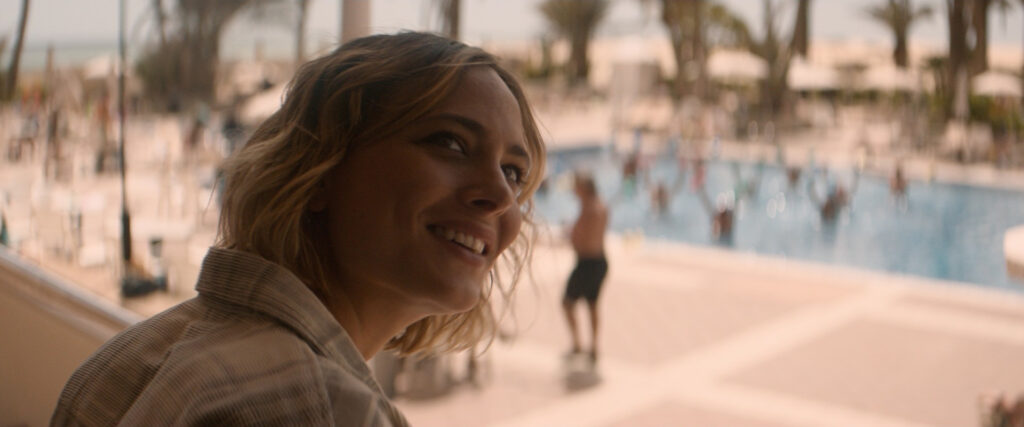
“American Star” is a deliberately paced, artful-looking story of an assassin who is emotionally torn over killing or saving a young woman who is his target. People expecting a fast-moving action film will be disappointed. This drama is a character study.
That’s not to say that there is no violence in “American Star.” The violent scenes in the movie are bloody and brutal. However, the violence is not the focus of “American Star,” which is more about what happens when an assassin gets emotionally attached to someone he is supposed to kill.
Directed by Gonzalo López-Gallego and written by Nacho Faerna, “American Star” doesn’t have the usual stereotype of the assassin falling in love with his target. The woman he is supposed to kill sees him as a father figure instead of a potential lover. This type of affection catches him off guard while he is under pressure to complete the “assignment” of murdering her.
The British assassin who is the central character in “American Star” is named Wilson (played by Ian McShane), a world-weary killer who is contemplating retirement. Wilson has traveled by plane to the island of Fuerteventura, which is part of Spain’s Canary Islands. (The movie was filmed on location in Fuerteventura.) Although it’s a beautiful location, and Wilson is staying at an upscale hotel, the weather in Feurteventura during this time of year is often cold and windy.
Someone else is in Fuerteventura to keep an eye on Wilson: his nephew Ryan (played by Adam Nagaitis), who is also an assassin. Ryan and Wilson also have the same boss. Ryan has been sent to be Wilson’s “backup” in case anything goes wrong or if Wilson can’t complete this hit job. Wilson has resentment that Ryan is there because, as Wilson tells Ryan: “I work alone.”
Wilson and Ryan (who is the son of Wilson’s sister) have a relationship that can best be described as “prickly,” for reasons that are somewhat vague and go back for many years. Ryan, who is dishonest and creepy, enjoys being an assassin and thinks Wilson is going “soft” in this assassin work. For reasons that are unexplained, Ryan has been lying to his mother by saying that Ryan is still living in Paris. This is the type of lie that is upsetting to Wilson, whose sister (Ryan’s mother) has no idea that Ryan and Wilson are hired hit men.
Besides being assassins who are family members, another thing that Wilson and Ryan have in common is that they both used to be soldiers in the British military. Ryan makes a comment to Wilson that being an assassin and being a soldier are similar, because they are both jobs where they get paid to kill people. Ryan thinks it’s better to be an assassin for these reasons: “Private work, less risks. We still carry guns and take orders.” Wilson insists that being an assassin and being a soldier are not the same thing.
Wilson has also been given the assignment to kill two people who live in a sleek luxury home in Fuerteventura: a wealthy man named Thomas (played by Thomas Kretschmann) and his significant other named Linda (played by Sabela Arán). But there’s someone else who’s on Wilson’s hit list: a cantina bartender named Gloria (played by Nora Arnezeder), who is originally from France. Gloria has been living in Feurteventura for the past six years. The reason why she’s been targeted for murder is revealed in the movie.
Wilson introduces himself to Gloria at her job by pretending to be a tourist who works in “personal security.” He asks for Gloria’s help in looking for a famous shipwreck in the ocean called the American Star, which is in a remote part of the island. Gloria offers to take Wilson to the American Star. And that’s the start of them getting to know each other better.
The American Star is a giant and very rusty ship that is still upright in the ocean and is partially hidden by cliffs. It’s quite a sight to behold. When Gloria takes Wilson to see the American Star, she explains the history behind how the ship ended up there.
The ship got wrecked in the early 1900s. There was talk of turning it into a prison, but those plans were canceled. In 1939, a tugboat was taking the American Star to Greece to turn the ship into a floating hotel, but the tugboat’s towline snapped, and the ship got permanently stuck in the ocean. In 1939, then-U.S. first lady Eleanor Roosevelt had even christened the American Star, but the next day, Adolf Hitler’s Nazi Germany invaded Poland. The ship has stayed in this part of the Atlantic Ocean ever since.
Viewers who look beyond the surface of what this movie is about can see that the American Star is a symbol for how Wilson feels about himself at this point in his life: an old relic who feels “stuck” in his existence. This is one of the reasons why the movie shows that Wilson becomes fascinated with the American Star. This lone ship in the ocean is a reflection of how lonely Wilson is. He doesn’t reveal much about his personal life to Gloria except to say that he’s not married, he lives alone, and he has no children.
Gloria tells Wilson that he reminds her of her deceased father. It’s hinted that Gloria’s father had a dangerous lifestyle of criminal activities, and he died because of it. Gloria eventually introduces Wilson to her mother Anne (played by Fanny Ardant), a real-estate agent who has been living in Feurteventura for the past 15 years. “American Star” shows that although Wilson doesn’t like to talk much, he gets into engaging conversations with Gloria, who is very talkative and curious, because he genuinely likes her. The feeling is mutual.
The movie has a somewhat unnecessary tangent showing Wilson having occasional friendly talks with a boy of about 8 or 9 years old named Max (played by Oscar Coleman), who is staying with his frequently quarreling and neglectful parents at a hotel room on the same floor as Wilson’s hotel room. Max is often left to do things on his own, which is how he gets acquainted with Wilson, who treats Max like a playful grandson. There seems to no real purpose for these scenes except to show that Wilson isn’t as cold-hearted and cruel as a lot of people might think he is.
McShane’s understated but effective performance in “American Star” is one of the main reasons to watch the movie, since almost everything that Wilson says or does has consequences in this story. Arnezeder is quite good in the role of Gloria, but Arnezeder has played ths type of “female character who exists to make the central male character feel good about himself” in other movies. “American Star” doesn’t sugarcoat or glorify what an assassin does in the act of killing, but it does give an up-close and interesting look at what happens when a meticulous assassin who likes to plan ahead ends up experiencing something that is unplanned—compassion and friendship for someone he’s been hired to murder.
IFC Films released “American Star” in select U.S. cinemas, on digital and VOD on January 26, 2024.


